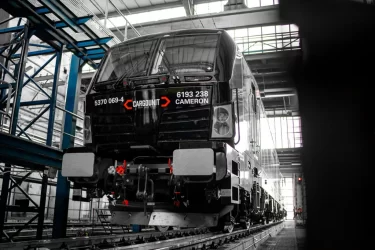Global industry leaders from North America, Asia and Europe announced today the formation of the North Pacific Green Corridor Consortium (NPGCC) whose members and partners will work together to decarbonise the value chain for commodities between North America and Asia.
The NPGCC will apply its collective expertise to develop a corridor for the decarbonized transportation of multiple commodities, including agricultural products, metal concentrates and steelmaking coal. The members of the NPGCC are committed to establishing the consortium as a catalyst for decarbonisation efforts, exploring new markets for low carbon fuels in North America and Asia, exploring propulsion options, and showcasing how carbon reduction initiatives can strengthen commercial partnerships.
The NPGCC brings together diverse sections of the value chain including bulk commodity producers, railway and intermodal transportation providers, marine vessel owners and operators, port facilities and port authorities, and clean technology providers. The nine founding members are CN, Mitsubishi Canada Ltd., Mitsubishi Heavy Industries, NYK Bulk & Projects Carriers, Oldendorff Carriers, Prince Rupert Port Authority, Teck Resources Limited (Teck), Trigon Pacific Terminals, and Vancouver Fraser Port Authority. The NPGCC is open to additional members and partners, in particular end-use customers, to contribute to the development and implementation of the green trade corridor.
The NPGCC’s activities will focus on pathways to optimise energy efficiency with the specific goal of advancing projects and infrastructure required to achieve meaningful emissions reductions in the near term. Consideration will be given to the potential production, storage and bunkering of lower-carbon fuels and propulsion options for use by NPGCC members and other parties. The NPGCC will also engage in research, knowledge-sharing, advocacy, member coordination and recruitment to accelerate members’ progress towards their decarbonisation objectives.
About the NPGCC:
The NPGCC was initiated in June 2023 when senior representatives of Teck joined Canada’s Minister of Transport at the G7 Transport Ministers’ Summit in Japan to present the vision to the world.
NPGCC members represent approximately 25% of the more than 100 million tonnes of bulk commodity products shipped annually through the ports of Vancouver and Prince Rupert.
The NPGCC is incorporated as a Canadian not-for-profit organisation, based in Vancouver, British Columbia. Core members of the NPGCC have entered a Memorandum of Understanding to facilitate collaboration and achievement of interim and long-term goals.
The NPGCC’s initial Board of Directors is composed of:
Ian Anderson – Senior Vice President and Chief Commercial Officer, Teck
Linda Kongerslev – Director, Global Engagement & Sustainability, Oldendorff Carriers
François Bélanger – Senior Director, Sustainability, CN
Tatsuhiko Asami – General Manager, Business Group No. 1, NYK Bulk & Projects Carriers
Robert Booker – Chief Executive Officer, Trigon Pacific Terminals
Michael Lagowski – Senior Vice President, Coordination & Strategic Planning, Mitsubishi Canada Ltd.
François Bélanger said: “CN is proud to join this collaborative and innovative initiative with partners that also recognise that our climate is changing and that businesses must not merely adapt, but be part of the solution. An ecosystem of collaboration across the value chain is key in achieving an effective transition to a low-carbon future. CN is committed to playing a key role in the transition to a low-carbon economy as our strategy to reduce our emissions contributes to reducing the Scope 3 emissions of our customers.”
Tatsuhiko Asami said: “We are delighted to join the North Pacific Green Corridor Consortium, which aims to realise decarbonised transport between Canada, Japan, and South Korea. The NYK Group is working to achieve net-zero emissions by 2050, which aligns with the NPGCC’s objective. We will keep moving toward global decarbonisation and a sustainable society together with our customers and partners through safe and clean transportation.”



